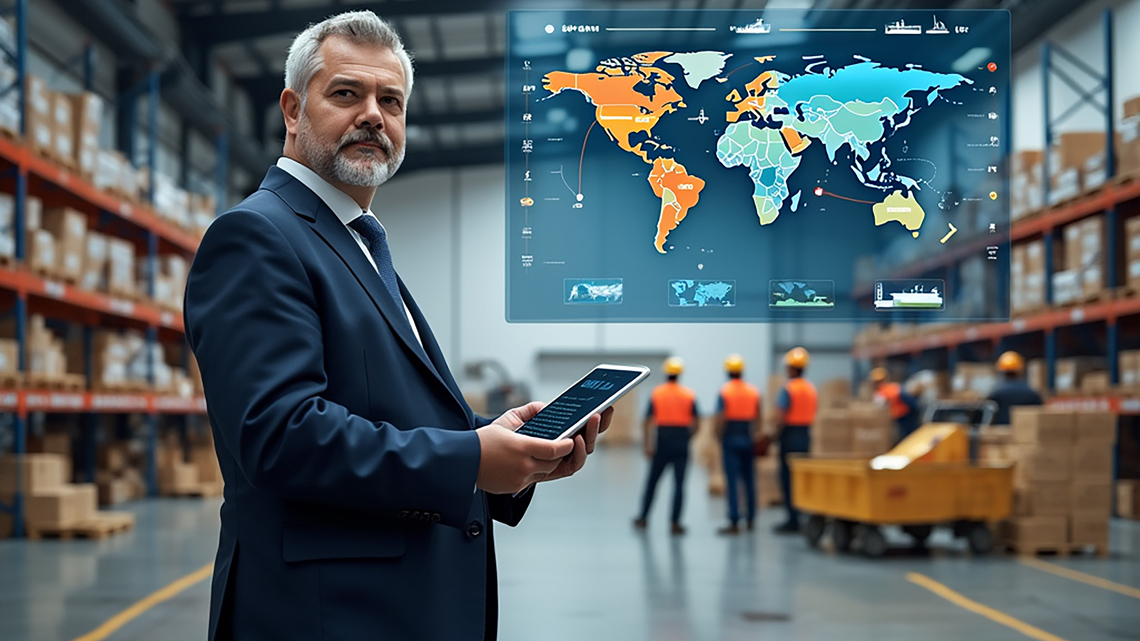
Globalization has changed the whole dynamic of how businesses operate, leading to the need for faster, more efficient, and more connected supply chains. Global logistics is central to this practice, which is a system suited for freight movement, data, and resources across international borders. Logistical functions go beyond just the transportation or delivery of goods, but rather coordinate the timely delivery of goods, aggregate the multidimensional risk management and more broadly help to ensure the collaborative function of supply chains. This blog explores the importance and the role of international logistics in supply chain management and how international logistics helps to enable global trade and business development.
What is Global Logistics?
Global logistics deals with the storage, planning and movement of goods across international lines. It involves many aspects of supply chain and logistics, including transportation, warehousing, inventory management, customs clearance, and order fulfillment.
Key components:
The fundamental components of worldwide logistics include:
- Transportation: Transportation of products by air, sea, rail, or road.
- Warehousing: Storage of products in strategic points in a worldwide system of interconnected networks.
- Customs and compliance: Following domestic laws, laws of foreign countries, tariffs, international documentation, etc.
- Inventory Control: Efficiently balancing supply and demand in a region.
- Technology: such as a logistics management system (LMS) and real-time tracking tool.
Relationship between logistics and supply chain performance: Logistics are part of a larger supply chain that refers to the overall lifecycle of a product from raw material to end user; Logistics focuses on the movement of that product and the coordination internally and externally of that product. By improving logistics and trading, the overall supply chain performance is improved in terms of time, cost, and reliability.
How Global Logistics Impacts Supply Chain Management
- Ensures Seamless International Transportation
Global logistics provides insight for businesses to keep up with rapidly changing international demand. It helps to launch products in underserved markets or respond to shifting demand patterns with the advance of flexible sourcing, quick fulfillment, and demand-driven inventory in placement strategies closely aligned to consumption points.
- Enhances Supply Chain Visibility and Control
Technology is employed in modern global logistics to give real-time visibility into the flow of goods. With key performance indicators, shipment tracking, and live delivery status of delivery, companies optimize operations. This efficiency facilitates better decision-making, improved increases, and disruptions can be addressed more quickly.
International logistics accelerate delivery timelines; predict emerging demands and setting organizations to stay current with the inventory.
- Reduces Costs and Optimizes Inventory
Global logistics provides access to multiple modes of transportation. An example would be shipping goods into a regional distribution center or hub, and then from that location using trucking as the format of transportation to retailers. Coordinating the handoff from the sea mode of transportation to trucking reduces congestion created in the supply chain, maximizes utilization of the container shipping, and shortens the timing of deliveries despite the complexity of crossing borders.
- Manages Risks and Disruptions
An agile supply chain is the ability for a business to change routes, suppliers or inventory on the fly. If a business has a fully developed international logistics framework, it can re-route shipments, look for secondary suppliers or reposition inventory in a way to improve lead times and ability to respond to disruptions.
- Supports Regulatory Compliance and Documentation
Logistics transcends more than just moving goods across but strategic alignment. New age logistics facilitates real-time collaboration with suppliers, logistic coordinates and distributors to promote transparency, shared accountability, and continual improvement across the supply chain.
- Enables Global Market Access and Expansion
When logistics works well, brands can enter and scale new markets, without incurring the full cost structure associated with establishing their own infrastructure. For example, good use of third-party logistics (3PL) providers and regional fulfillment centers allow brands to “test markets” rapidly and at local level fulfillment to their global customers.
What are the Challenges in Global Logistics
Logistics and Supply Chain Management presents unique challenges that businesses continually negotiate:
- Geopolitical risks and trade disputes
International disputes, trade wars, regulatory penalties, the post-Brexit regulatory environment highly affected cross-border logistics. Surpassing geopolitical risks requires diversifying sourcing as well as routing options.
- Port congestion, delays, and capacity issues
Unlike Developed countries where logistics networks are advanced, emerging markets are hounded by unreliable infrastructure. Limited warehousing coupled with poor road conditions as well as bureaucratic red tape can delay the delivery timelines and erode the flow of inventory.
- Currency fluctuations and cost volatility
Courtesy of environmentalists, businesses have had to embrace greener practices for logistics operations. Suspending Carbon emissions needs to be adopted alongside eco-friendly packaging which fulfills investor regulations.
- Compliance difficulties
Global Operations face countless challenges such as port labor strikes, skilled professionals, lack of drivers/riders willing to work.
Fueling advanced automation alongside revolutionizing human resource strategies has been proven effective in securing future logistics teams.
Conclusion
Moving ahead, global logistics continues to provide foundational support for developing high-performing supply chains. It helps to ensure reliable delivery, creates improved agility of supply chains, and enables greater access to international markets. In today’s business environment, where the speed and resilience of supply chains are competitive drivers for success, businesses need to see logistics as a strategic component to streamline supply chain activities. Companies that engage in a more innovative and globally coordinated manner understand the potential of logistics for sustainable growth and operational excellence and through that they can achieve long-term commercial viability in a globally connected market.
To read more, visit APAC Entrepreneur.
